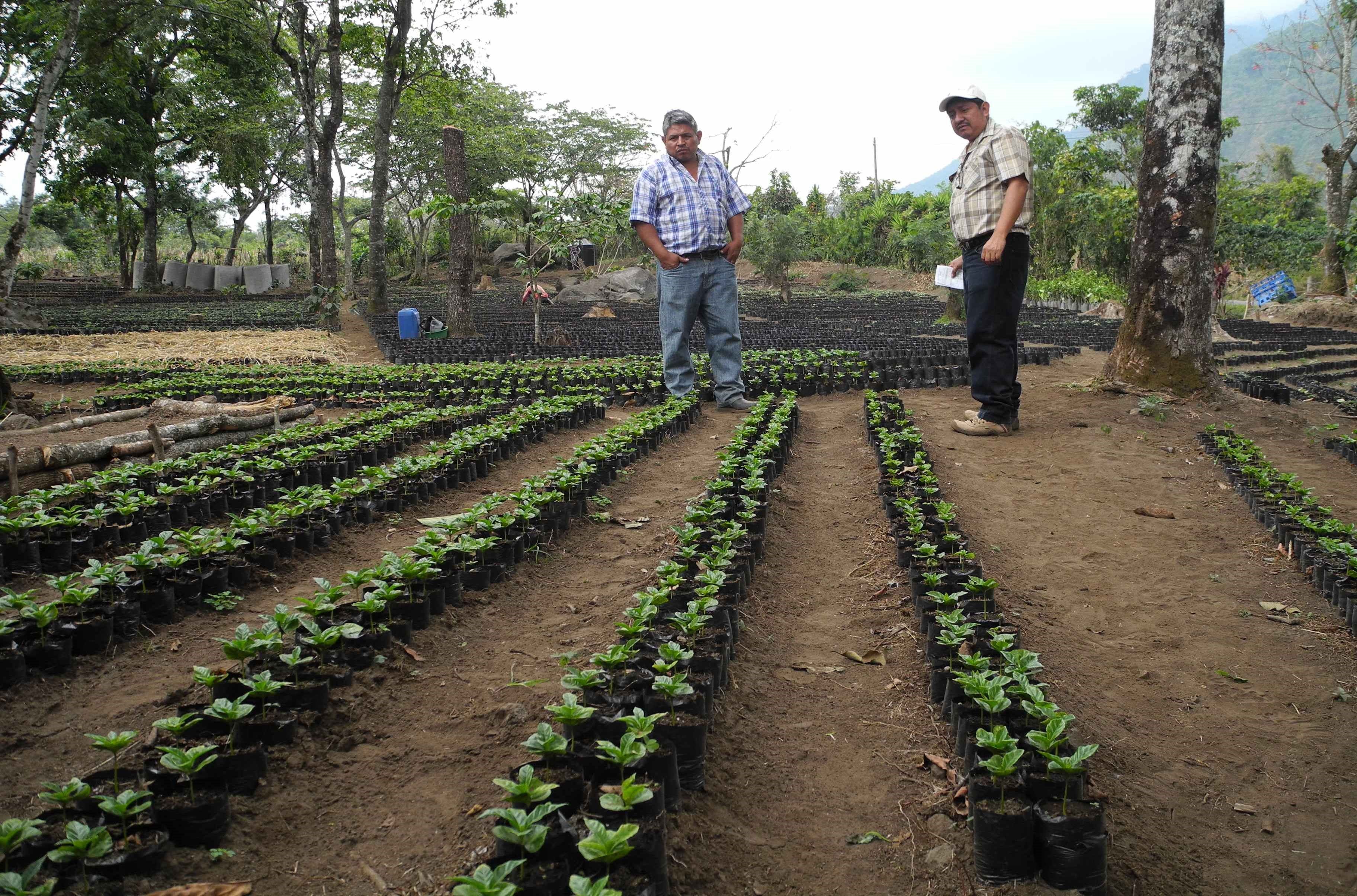Guatemala
Asociacion Chajulense
The Asociación Chajulense Va’l Vaq Qujol is located in the municipality of San Gaspar Chajul, in the region known as the "Ixil Triangle" in the department of Quiché in central Guatemala.

The Ixil Trangle was battered by violence during the decade of the 1970's and through the 1980's as the government mounted its response to guerilla activity in the region. It was in the 1980's that an Italian priest, Rosolino Bianchetti, arrived in Chajul to lead the local parish. Under the tutelage of Bianchetti, who was promoting the principles of Liberation Theology, an initial cohort of 40 farmers founded the asociation in 1988. The organization gained legal status in 1990 and now is comprised of over 1,300 farmers working in 56 communities of the Chajul, Nebaj, Cotzal and Chiantla areas. Since its inception, the primary objective of Asociación Chajulense is to “promote a sustainable development model that is environmentally sound, economically feasible, fair from a social point of view and appropriate from a cultural standpoint."

Coffee is the main crop for the communities in Ixil, where land-holdings tend to be much smaller on average compared to the rest of Guatemala. Other crops include corn and beans that help supplement household diets, but coffee is the only income generator for families. This drove the association to focus on developing its export capacity and establishing direct relationships with buyers and coffee roasters in order to capture the most value for their farmers.
Chajulense exported its first bags of coffee at the end of the 80’s and the beginning of the 90’s, expanding opportunities through Fair Trade and organic certification obtianed in the mid 00's. In 2006, Cooperative Coffees purchased one of the first Asociación Chajulense containers of fair trade and organic coffee shipped to the US market. Since then we have purchased and roasted nearly two million pounds. In 2013/2014 coffee farmers in Guatemala were ravaged by leaf rust - la roya, and Chajulense lost over 80% of its production. Mobilizing support of allies such as Root Capital and Coffee Trust, and buyers such as Equal Exchange and Cooperative Coffees, Asociación Chajulense has greatly recovered production since.
In addition to their coffee sales, the organization has marketed other products such as cardamom, cheese, honey, and handicrafts as a means to diversify their member families’ income. Two succesful ventures have spun off from the Chajulense organization, including the beekeepers cooperative COPICHAJULENSE, R.L. and a women's weaving cooperative Asociación Chajulense de Mujeres Unidas por la Vida.
Rio Azul
The Cooperativa Agrícola y de Servicios Varios Río Azul is located in the remote western Guatemalan town of Jacaltenango, settled in the valley of the same name. All members of the cooperative are of the Mayan group Jacaltec, also commonly called Pobp’ al Ti’ or Popti people. Founded in 1967, the cooperative has a long history of producing some of the best coffee exported under the famed “Huehuetenango” mark.

The members of Rio Azul all live no more than a 1.5 hour walk to the wet mill in Jacaltenango. This allows the cooperative complete control over several stages of the quality process. Coffee is picked by members until early afternoon and then delivered in cherry form to the mill each afternoon. The coffee is de-pulped, fermented and washed at the centralized wet-mill and then spread out to sun-dry on the adjacent patios. The parchment is stored in their warehouse awaiting export. As the shipping day approaches the coffee is transferred to Guatemala City for final processing and export preparation in an organic dry mill.

Due to the careful attention given each step of the way – from farmer to final processing – and the excellent growing conditions in this area, Rio Azul coffee comes in consistently pungent dark chocolate aromas, sweet, citric acidity and a long, lingering finish of delicately balanced flavors. Rio Azul farmers work hard to maintain these high standards. Collectively – they strive to become more financially sustainable and self-sufficient as a cooperative and to provide members with greater technical assistance to improve yields and improve coffee and shade tree management.
Coop Coffee first “discovered” Rio Azul following a roaster / producer exchange in Quetzaltenango in 2005. Timing was perfect as Rio Azul was undergoing its own organizational restructuring and looking for commercial clients interested in trading fair and direct. We imported our first container of Rio Azul coffee in 2006 and have been savoring our allocated, annual container-loads of their fine coffee ever since!
CCDA
The CCDA (Comité Campesino del Altiplano) got its start in 1982, during some of the most turbulent years of the Guatemalan civil war. Originally named Campesino Committee in Defence of the Highlands, and headquartered in San Martin Jilotepeque, Chimaltenango, the organization was perceived by the military government as an armed opposition group – which ultimately led to the arrest, disappearance, assassination and exile of many of the CCDA directors. And while the organization continued to struggle for recognition of land rights for their Indigenous communities, the CCDA changed its name to the Campesino Committee of the Highlands in the hopes of establishing a more peaceful relationship with the military authorities. However, it had to continue working clandestinely until 1988, when the armed conflict slowly subsided.

CCDA succeeded in becoming a legal organization in 2000, and CCDA members were finally able to participate more freely at regional, departmental, national and international levels in defense of Indigenous access to land and the agricultural situation, labour rights, human rights and the Mayan cultural situation.
CCDA as a political organization operates in 11 departments in Guatemala, but Cafe Justicia — the branch of the organization that supports the production and marketing of members’ coffee — operates solely in the Lake Atitlan region. Coffee is one of the major sources of support for their political struggles; and Cafe Justicia hopes to continue expanding their markets in the United States and Canada via our member roasters and others.
Locally, CCDA has made huge strides in promoting organic agriculture amongst its members and in Sololá. They have 3 part-time organic técnicos and an agronomist on staff, advising members on best practices in organic agriculture. CCDA has four centers for organic fertilizer production, which produce bokashi, vermicompost and effective micro-organisms for members. Their worm composting project, which has been growing since its inception in 2008, now has each center producing about 1000 lbs of compost in a month, which is then sold to members at the subsidized price of 60 quetzales (about $8) per 100 lb sack. Meanwhile, bokashi and seedlings are offered free of charge to members, based on a system of coop loyalty and how much total coffee is sold to the coop versus to outside intermediaries.

Through their hard work on the land and diligent quality control through every step of processing from harvest to drying patio and on to final selection, the members of CCDA are able to produce a fine coffee with classic Lake Atitlan region characteristics: clean and sparkling acidity, balanced with nuances of plum and tropical fruits, rich body and dark cocoa. Through the successful export and sales of their coffee, Cafe Justicia supports CCDA’s efforts to lobby the Guatemalan government for more equitable rural development policies and basic respect for Indigenous Rights.
Improved access to education is one important fruit of Cafe Justicia’s labour. From the profits of their coffee sales, CCDA has established a scholarship fund – from primary school through university. In 2012 alone, they had 32 students – the sons and daughters of CCDA members – enrolled in university thanks to this program. They also have established a 200,000 quetzal, rotating credit fund available to members. Cafe Justicia lends out a maximum credit line of 5000 quetzales (about $650) for investment in renovation, pruning and shade management in coffee plots, as well as micro-credit lending program available to members for non coffee-related investments. In the town of Quixayá, CCDA operates a local clinic and pharmacy which offers discounted health services to CCDA members as well as to the general community. We only began importing from CCDA in 2011, but have quickly developed a friendly and trusted relationship. We look forward to our long and mutually beneficial future to come!
Manos Campesinas
Throughout the 1990s, the Catholic Diocese of Quetzaltenango maintained an active program offering technical and organizational support to small-scale coffee farmers in western Guatemala as a means of poverty alleviation and economic development. However, despite this support, farmers still lacked the means to bring their product to market, and had to resort to selling to middlemen, “coyotes”, who cut them out of the greater market. It was with the goal of gaining direct access to international buyers that the Asociación de Pequeños Productores de Café Manos Campesinas was conceived in 1996. Organized as a secondary level organization, the cooperative developed direct export channels for a founding group of 6 farmer associations. Today, Manos Campesinas is comprised of 13 cooperative groups across the departments of San Marcos, Quetzaltenango, Sololá and Chimaltenango, and it represents over 1,200 farming families.

Manos Campesinas strives to maximize the benefit of its activities by offering the highest return and best prices to member farmers, investing most of the profits in technical support. The association works with a small, core administrative staff as well as strong technical department working closely with farmers on the field.
Manos Campesinas is fiercely independent and proud of its self-sustaining and finanially responsible business model. They actively seek to avoid the need for external support from international governments and NGOs, which can often simply lead to more north-south dependency. The association’s seven strategic values include a commitment to social responsibility, quality, sustainability, gender equality, and environmental protection. They aim to be the first choice for customers around the world, not only for the quality of its coffee, but also for quality of service and the positive impact it has in it's members' communities.

The majority of the coffee grown by Manos Campesinas’ members is high-altitude SHB (Strictly Hard Bean), with a diversity of coffee profiles, from the rich chocolatey coffees of San Marcos to the tart berry-like coffees of Sololá and Lake Atitlán.
Cooperative Coffees sources coffee largely from the region of San Marcos, from organizations nestled in the volcanic soils between the Tajomulco and Tacaná volcanos. To this day, we continue to work with APECAFORM (the Maya-Mam Association of Smallholder Organic Coffee Farmers), the first organization to export fair trade organic coffee through Manos Campesinas.

